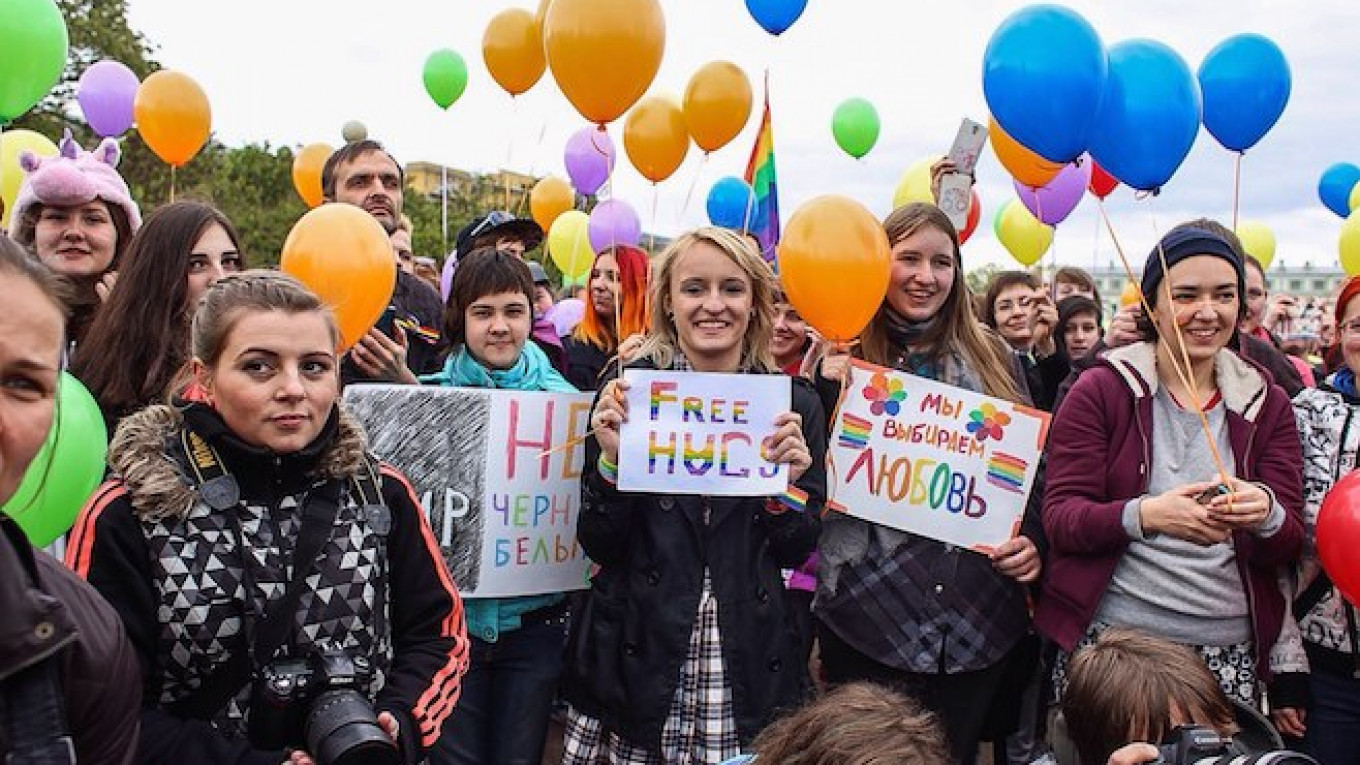LGBT activists in St. Petersburg hosted a peaceful rally on Sunday while in Moscow, 17 gay rights campaigners were arrested at a similar event.
Gay rights supporters in both cities gathered to mark the 25th anniversary of the day the World Health Organization removed homosexuality from its disease classification, which took place on May 17, 1990. The day is now recognized by LGBT communities worldwide as the International Day Against Homophobia, Transphobia and Biphobia.
LGBT rights activists gathered in St. Petersburg with rainbow-colored flags and balloons, and banners calling for "love without borders," in a rally that proceeded without police interference.
The Sunday gathering at Field of Mars park in the center of the city had been approved by the authorities — despite Russia's law that bans gay "propaganda" in front of minors. Police were standing by to protect demonstrators from any opponents as well as to shield children who happened to pass by from the influence of "propaganda," Russian media reports said.
A little girl tried to approach the demonstration asking for a colorful balloon, only to be held back initially by both police officers, who warned against "propaganda," and rally organizers, who feared a "provocation," Open Russia news portal reported.
After a brief delay, however, she received a balloon, the report said.
Participants in the rally carried banners that read: "We choose love," "Love is not a sin," "The world is not black and white," and "Love without borders," according to photos posted online.
Some of the rally participants also carried signs reading "Glory to Putin," and "Russia, forward," the FlashNord news portal reported.
"It's tough, members of the LGBT community face lots of discrimination in their lives, at work, at school... people are faced with violence in the streets," said protester Nika Yuryeva.
In anticipation of a counter-rally by anti-gay activists, police established a large buffer zone around the gathering, while rally organizers arranged for several buses that could have whisked demonstrators away in case of any clashes, BBC's Russian Service reported.
But opponents failed to materialize, according to Russian media reports.
Notably absent was St. Petersburg's gay-bashing lawmaker, Valery Milonov, well-known for showing up at gay rights events to denounce their participants. However, his wife, Eva Liburkina, and a group of the lawmaker's aides showed up near the rally, Flash Nord reported.
Rally participants mocked the gay-bashing lawmaker by handing out lollipops shaped as his head, accompanied by a note that read: "Don't suck in St. Petersburg," media reports said.
Demonstrators ended the gathering by releasing dozens of balloons in the colors of the rainbow into the sky, FlashNord reported.
In the Russian capital, however, 17 protestors were detained by police at a failed flashmob, according to organizers.
Some 50 people assembled on a square outside a Moscow theater, but crowd control police showed up with a bus and started shoving the protesters inside before they managed to unfurl any banners or chant any slogans.
One of the organizers, Andrei Obolensky, said later that he and others were still detained at a police station, and only one of them had so far been released.
The LGBT community has come under increased pressure in Russia as President Vladimir Putin has charted a more conservative course since starting his third term in 2012.
A 2013 law against gay "propaganda" sparked an outcry among Russian rights activists and in the West. But partly reflecting the influence of the Orthodox church, many Russians back the law or have negative feelings towards gays.
(MT / Reuters)
A Message from The Moscow Times:
Dear readers,
We are facing unprecedented challenges. Russia's Prosecutor General's Office has designated The Moscow Times as an "undesirable" organization, criminalizing our work and putting our staff at risk of prosecution. This follows our earlier unjust labeling as a "foreign agent."
These actions are direct attempts to silence independent journalism in Russia. The authorities claim our work "discredits the decisions of the Russian leadership." We see things differently: we strive to provide accurate, unbiased reporting on Russia.
We, the journalists of The Moscow Times, refuse to be silenced. But to continue our work, we need your help.
Your support, no matter how small, makes a world of difference. If you can, please support us monthly starting from just $2. It's quick to set up, and every contribution makes a significant impact.
By supporting The Moscow Times, you're defending open, independent journalism in the face of repression. Thank you for standing with us.
Remind me later.






